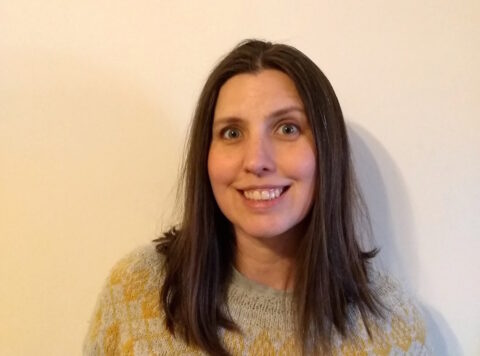You present a story with two characters and one of them doesn’t speak, is no longer capable of speaking. Did you ever consider having Beryl speak here? If so, what would she say?
She’d definitely request a song and dance number, something with heart, because her time on this earth is already so fleeting. But I was intentionally playing on the grunting zombie trope and never meant for Beryl to have coherent speech. Consciously, I was also very much wrestling with feelings about my own lewd-humored grandmother who suffered a similar stroke before she passed; her final aphasic message to me, like a record played backwards, loops in my head as its own kind of horror. But if Beryl, our storied grandmother, could talk, I think she’d tell her granddaughter (and all of us) to embrace whatever kind of happiness is available. Fight the power, for sure, but also rejoice in whatever pleasures are on offer while we still have the chance. Our bodies and lives are worth more than we think, more than the powers at be want us to believe.
The looting you mention in the first sentence never comes up again, the premise established, the narrator holed up in assisted living. But then the fictional zombie apocalypse becomes a sort of proxy. Is our fate that inescapable?
It certainly feels like that more and more lately. You know times are bad when a horror movie serves as an escape from the madness of the world. In one sense the zombies are a visible manifestation of this more absurd and intangible reality, but one we can actually fight. However, there’s a duality here as well because, unless we keep our heads, we become the mindless mob. It’s a philosophical ouroboros.
Rather than focusing on the chaos outside, I chose to center the story on the complexity of this beautiful and changing relationship, the dark heart of the story. I love how this choice allows the zombies to offer up some needed levity as a counterbalance. Classically, zombies are clumsy and dumb—slow and staggering gait, limbs randomly dropping off—I imagine we can smell them coming. Unlike other kinds of horror, it’s difficult to take zombies seriously (until they show up at your door).
This duck is insatiable. Do you think our escalating tariffs might keep it in check? Or, if the duck is a metaphor for America, will it just keep winning?
Initially, the duck was a joke pulled from a friend’s autocorrected obscenity-laden texts. But, as in the story, it quickly grew into this massive presence of greed and destruction, foreshadowing my worst fears. And certainly, those fears are now being realized in real time. Maybe the duck is everything?
As a story element, the duck has to be insatiable. You almost never see the movie monster knitting by the fire. And even as we sit with Beryl, the monster of paralyzing change is running through her as well, always there, driving the story forward. Unfortunately, there are some wars we can’t win; monsters we can’t defeat. But the more a monster shows its face, the more destruction it causes, hopefully the more it galvanizes the rest of us into counteraction.
Your narrator is hiding. Not from looters, not from zombies, but everything. She implies it herself, putting words/thoughts into her grandmother’s mouth. What’s she hiding from? Or is it easier to list what she’s not hiding from?
Well, she’s there with Grandma—protecting her, not infantilizing her, offering her some dignity and vodka—so she’s facing some of it. Even if it’s only with half her heart open and steeled against the eventuality of loss. And although the narrator appears to be hiding from the chaos of the regime change, it doesn’t mean she’s not deeply affected by it. Which begs the question of the moment: What to do with all our angst in the midst of so much uncertainty and danger? Especially if you’re a woman in America, or an immigrant, or LGBTQ+ … hell, even a scientist. Maybe the narrator isn’t dating because of the growing manosphere and she’s at risk of losing her right to choose. Maybe she’s not cis or straight or white. Maybe she’s attempting to shield Grandma from the horrors outside, masking the sounds of chaos with chaos. Maybe she wants to fight but denies that impulse because she deems Grandma more important in this moment. The narrator could be any one of us—angry, overwhelmed, paralyzed with fear over the enormity of both what she imagines is coming and what’s already begun. Is hiding even possible? And how do we keep showing up for each other with love while also fighting … everything?
Somebody made this movie they’re watching. How does Tarantino end it? Scorsese? Wes Anderson? Feel free to sub in your favorite director.
Oh, I would love to see a Wes Anderson version; it would be hauntingly quirky and beautiful (Wes, are you listening?!), and I wonder what he would make of the duck. Tarantino’s would be even more of a gore-fest, perhaps everyday vigilantes armed with machetes kicking ass … but then we’re back to the whole question of what (or who) do the zombies actually represent? Do we want them to lose or win? Are there any heroes here at all?
Inevitably, as a humorous homage to the cult classic film The Return of the Living Dead (oh, how teenage me adored this film’s humor), I foresee a false-win scenario at the end. Maybe, for grins, let’s recast the cardboard-faced president with a more colorful representation. And, having put an “end” to all this “zombie nonsense” (mushroom cloud billowing in the distance), he objectifies the flight attendant and demands a Diet Coke and twelve Big Macs. Of course, the zombies have already infiltrated the plane. They turn his entire staff, who, slo-mo and en masse, wild-eyed with blood-encrusted teeth, turn on him, leaving it wide open for a sequel—that’s capitalism for you. Eventually we’ll get it right.



 The SmokeLong Grand Micro Contest (The Mikey) is now an annual competition celebrating and compensating the best micro fiction and nonfiction online.
The SmokeLong Grand Micro Contest (The Mikey) is now an annual competition celebrating and compensating the best micro fiction and nonfiction online.